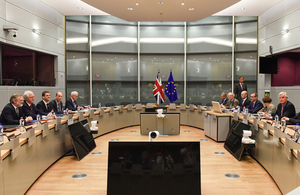Position papers published ahead of third round of negotiations
The papers outline the UK’s negotiating approach to goods on the market and to confidentiality and access to official documents

Negotiating room
The position papers outlining the UK’s negotiating approach to goods on the market and to confidentiality and access to official documents have been published today ahead of the third round of negotiations.
The documents make the case for why it is in the interests of both the EU and the UK that our exit is as smooth and orderly as possible for UK and European businesses and consumers.
The EU exports goods worth €314 billion (around £257 billion) to the UK, more than to Brazil, Russia, India and China combined, which is why it is in no-one’s interest to see disruption and uncertainty.
Secretary of State for Exiting the European Union David Davis said:
These papers will help give businesses and consumers certainty and confidence in the UK’s status as an economic powerhouse after we have left the EU.
They also show that as we enter the third round of negotiations, it is clear that our separation from the EU and future relationship are inextricably linked.
We have already begun to set out what we would like to see from a future relationship on issues such as customs and are ready to begin a formal dialogue on this and other issues.
Business Secretary Greg Clark said:
As we prepare to leave the European Union, the Government has engaged with businesses across the country to ensure our negotiating position reflects their priorities, giving them the certainty they need.
Through my meetings with leading UK businesses and their representative bodies, I understand the importance they place on ensuring trade with the EU remains as frictionless and barrier-free as possible and these negotiation papers reflect this.
We will continue to do all we can to support our world-class sectors and through our Industrial Strategy we will continue to create the business environment where companies big and small can thrive.
The UK has been clear that exporters and businesses need to be able to plan ahead with certainty which is why we want to seek an agreement with the EU which allows the freest and most frictionless trade possible in goods and services.
The UK enters these discussions with this in mind, and the proposals set out in this paper are designed to ensure the millions of consumers and businesses across Europe have the certainty they have asked for.
The papers lay out the following UK positions:
Goods on the market
Our ambition is to seek an agreement with the EU which allows the freest and most frictionless trade possible in goods and services, to the benefit of all. The paper outlines four key principles for ensuring a smooth and orderly withdrawal from the EU in regard to the availability of goods.
- Firstly, we want to ensure that goods which are placed on the market before exit day can continue to be sold in the UK and EU, without any additional requirements or restrictions.
- Secondly, we want to avoid unnecessary duplication of compliance activities that have been undertaken by businesses prior to exit. This means that where products have gone through an authorisation process prior to exit, for example a type approval for a car, this approval should remain valid in both markets after exit.
- Thirdly, we are clear that patient safety and consumer protection in the EU27 and UK are paramount, which means that any agreement will need to facilitate the continued oversight of products to ensure the necessary action can be taken for non-compliant or unsafe goods.
- Finally, the provision of goods and services is increasingly interconnected. Services are essential for production of goods, for their sale, distribution and delivery, and for their operation and repair. Where goods are supplied with services, we believe there should be no restriction to the provision of these services.
These four principles demonstrate that the UK is getting on with the job of negotiating. Taken together, they would prevent bureaucracy and unnecessary duplication of effort by business, or restricted supply of certain products to consumers, which might otherwise occur. But our position remains that the best way to address these risks is through discussions on a deep and special future partnership which enables our close trading relationship to continue to flourish.
Read the position paper on Continuity in the availability of goods for the EU and the UK
Confidentiality and access to documents
This paper shows that we are getting on with negotiations by directly responding to the EU’s paper on “Issues relating to the Functioning of the Union Institutions, Agencies and Bodies.”
As the UK leaves the EU, it will be important to establish a framework for the continued respect of obligations of confidentiality and the protection of official documents exchanged while it was a Member State. The UK considers that any agreement on confidentiality and access to official documents produced or exchanged while the UK was a Member State should be reciprocal, affording an equivalent level of protection to the UK and the EU after the UK’s withdrawal. The necessary protections concerning both UK and EU data should be on equivalent terms to those laid out in existing regimes.
Read the position paper on Confidentiality and access to documents
All our position papers and future partnership papers can be found on our Article 50 and negotiations page